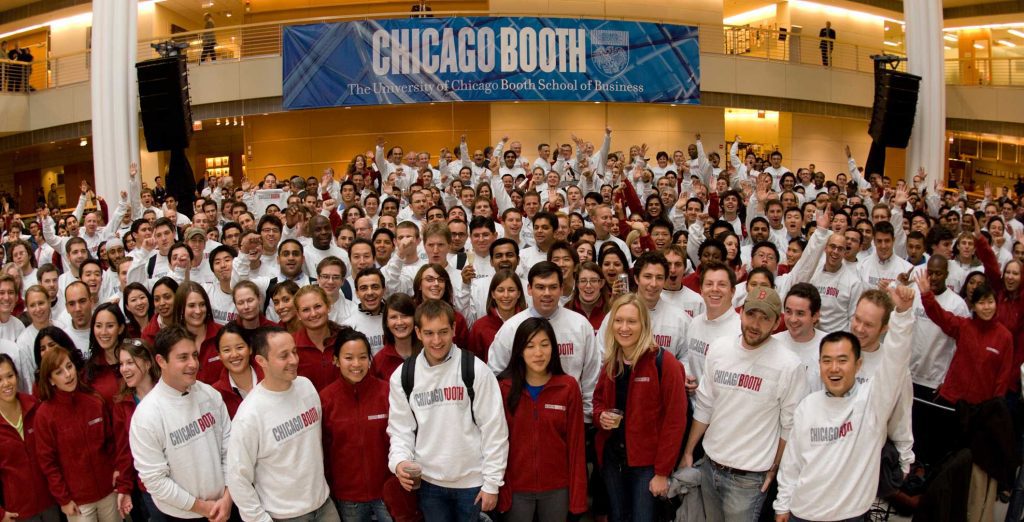Top MBA Recruiters: IDEO

If you’re interested in international design and consulting, IDEO (pronounced eye-dee-oh) should be on your radar. Launched in Palo Alto, CA in 1991, the company is known for using design-thinking methodology to design its products, services, environments, and digital experiences. They’re involved in a wide range of consumer products (toothbrushes, computers, personal assistants, etc.) experiences (non-traditional classrooms), as well as management consulting and organizational design.
Known for designing the first manufactured mouse for Apple, IDEO leads the way for human-centered design. As their website says, “IDEO has long been at the forefront of creating change through design.” Continue reading…
Chicago Booth, Northwestern Kellogg Top Economist 2018 Rankings

The newest Economist best MBA rankings for full-time programs is officially out, with two Chicago schools topping the list.
Chicago Booth, Michigan Rise in New U.S. News Business School Ranking

The new, official U.S. News & World Report ranking of the best business schools in the United States has been released, with some minor shake-ups at the top. For the second year in a row, Harvard Business School remains tied for the first overall in the ranking. However, the University of Chicago Booth School of Business officially supplanted The Wharton School at the University of Pennsylvania, which fell back from its tie at the top to third overall.
The rest of the top ten, as we previously mentioned, largely resembled last year’s U.S. News release, except for the inclusion of the Ross School of Business at the University of Michigan and the exclusion of the Yale School of Management. Surprisingly, Michigan Ross may have made the strongest showing in the newest ranking, not only managing a position in the top 10, but landing tied for seventh overall—ahead of Columbia Business School and the Dartmouth Tuck School of Business. The Yale School of Management slipped to a tie at 11th overall with Duke University’s Fuqua School of Business.
U.S. News & World Report 2019 Best Business School Rankings
| Rank | School |
|---|---|
| 1st (Tied) | Harvard Business School |
| 1st (Tied) | University of Chicago Booth School of Business |
| 3rd | The Wharton School at the University of Pennsylvania |
| 4th | Stanford GSB |
| 5th | MIT Sloan School of Management |
| 6th | Northwestern University Kellogg School of Management |
| 7th (Tied) | University of Michigan Stephen M. Ross Business School |
| 7th (Tied) | UC Berkeley Haas School of Business |
| 9th | Columbia Business School |
| 10th | Dartmouth College Tuck School of Business |
Chicago Booth, Michigan Shine Among Rising Full-Time MBA Programs

For the first time in school history, the Booth School of Business secured its place atop of the U.S. News ranking (albeit tied with HBS). In a statement, Booth Dean Madhav Rajan noted, “We are pleased to be recognized in this manner, and gratified that the recognition is across the board. We continue to strive to be the pre-eminent academic school of business.”
After its place among the top ten business schools was revealed, Michigan Ross Dean of Business Scott DeRue stated in a release, “We are excited to once again be ranked among the top 10 MBA programs in the country by U.S. News & World Report. This recognition is a testament to the extraordinary talent at Michigan Ross, our innovations in action-based learning, our partnerships with leading companies across the globe, and the most supportive alumni community in the world. We are developing leaders who have the character and capabilities to transform the world through business, and it’s an honor to be recognized among the very best in the world.”
On its website, the school also proudly boasted that, outside of Stanford GSB, no business school in the ranking earned more top ten placements in specialty areas, earning high grades for: “Accounting (No. 4), Entrepreneurship (No. 7), Finance (No. 10), International (No. 5), Management (No. 3), Marketing (No. 4), Non-Profit (No. 5), Productions/Operations (No. 3), and Supply Chain (No. 6).”
Outside of the top ten, the USC Marshall School of Business watched its stock rise again this year. Two years ago, U.S. News handed USC Marshall the 31st spot on its best business school ranking, which jumped to 24th last year, and 20th this year. Just a few spots back of USC was the Jones Graduate School of Business at Rice University, which saw the largest leap of any of the top 25 schools—jumping six spots from the previous year.
Nine schools among the top 100 in the new rankings managed to jump at least ten spots, including three MetroMBA favorites: the Whitman School of Management at Syracuse University, the Neeley School of Business at TCU, and the Fordham School of Business at Fordham University. Whitman, in fact, tied for second highest rise, improving 18 spots overall from last year’s 88th overall placement to 70th this year. No school improved more, however, than the Weatherhead School of Management at Case Western Reserve University in Cleveland, Ohio, which improved a remarkable 22 spots from last year’s 77th overall placement to 55th this year.

The Syracuse University Whitman School of Management jumped 18 spots in the most recent U.S. News “Best Business Schools” ranking.
A handful of schools also secured a spot in the top 100 after not appearing at all the previous year, including the Howard University School of Business, the American University Kogod School of Business, and Argyros School of Business and Economics at Chapman University.
Which Schools Fell The Hardest?
Along with the Yale School of Management losing its prestigious top ten status, a handful of schools tumbled in the 2019 ranking—with some virtually flat-lining. No school fell more than the Poole College of Management at North Carolina State University, slipping an astounding 35 spots from 55th last year to 92nd this year. Eleven schools lost their top 100 status in total. The reasoning behind the sudden drops are likely linked to the publication’s change in how it ranks the business schools.
In regards to the ranking methodology, U.S. News placed less value in test scores and student GPA. In a release this afternoon, U.S. News reported the following:
“For the first time U.S. News reduced the value of reported GPA, GRE and GMAT scores for full-time and part-time MBA programs and GRE scores in the education rankings if less than 50 percent of an entering class submitted these scores. U.S. News believes this lack of data means the scores are not representative of the entire class.”
The change, arguably, could stem from the fallout of the Temple University Fox School of Business, which was knocked off all of the publication’s rankings for the 2018 calendar year because of falsely reported data regarding test scores.
Stay tuned to MetroMBA on all the biggest MBA ranking news.
How to Ace These 5 MBA Interview Questions

Clear Admit recently explored 5 crucial interview questions you’ll need to know during the height of MBA interview season, based off the site’s in-depth interview guides and archives, which you can read below.
Interviews, interviews, interviews … it’s all anyone seems to be talking about these days, and with good reason. Harvard Business School, Michigan’s Ross School, Chicago Booth, NYU Stern, and UVA Darden are just some of the schools that have already or are in the process of sending out Round 2 interview invitations. Stanford GSB, MIT Sloan, and UPenn / Wharton are among those soon to come.
Instead of driving yourself crazy with worry, why not buckle down and perfect your answers to the questions you are most likely to be asked? To help you prepare, we’ve scoured our Interview Guides and Interview Archive to compile our very own list of five MBA interview questions you need to ace. These questions are among those that most often make their way into MBA admissions interviews at leading schools.
While the questions listed here are most commonly asked as part of blind interviews, they can certainly also come up in the course of non-blind interviews. In those cases, you’ll want to be prepared to go deeper into some of the specific experiences you shared in your application. (Check out our quick refresher on the difference between blind and non-blind interviews).
For detailed insights into each school’s interview process, the questions they ask, and how to tackle those questions, access Clear Admit’s Interview Guides.
5 MBA Admissions Interview Questions You Need to Ace
Walk me through your résumé.
The real trick with answering this open-ended question is to gauge how much detail is too much. Imposing a structure can help. “It’s best to err on the side of brevity,” says Alex Brown, who asked this very question of many hopeful Wharton applicants during his time working in admissions at the Philadelphia school. “Think of this résumé walk-through as simply laying the groundwork for deeper discussion of your background and accomplishments.” A good idea is to develop a two- to three-minute run-through, beginning with where you grew up and went to college, what you studied and perhaps something you enjoy outside of work. Then move into a concise overview of your work experience, beginning with your first job and continuing to present day, making sure to explain why you made the choices you did and what you learned in each major role. “This kind of high-level overview gives your interviewer the perfect opportunity to ask for more detail about specific points if she wants it,” Brown says. If you have a gap of three or more months due to unemployment or some other cause, you should be prepared to address it, Brown warns, although in a short résumé question as part of the interview, it may not come up.
What are your career goals?
With any luck, you will already have a well-honed response to this question, developed and refined as part of the process of writing your application essays. “If you are looking to shift industry or function, this is your chance to explain your reasoning and that you have carefully thought through what may be involved in successfully making the transition,” Brown says. Keep in mind why the adcom is asking this question, Brown suggests. “They want to know how focused you are on the MBA and whether you are in a position to take advantage of the resources business school offers or at risk of getting overwhelmed,” he says. Present a very clear post-MBA goal, Brown recommends. “Schools prefer to admit students who can explain exactly what kind of job they want to pursue beyond graduation and articulate how it will set them up to obtain their long-term career objectives,” he says. Schools are also looking, with this question, to see if your goals make sense and are feasible in light of your past experiences; are you able to articulate a clear path and plan?
Why X school?
Here, schools want to see if you have really done your research on their program and whether you are a good fit with their culture. So, do your research. “I recommend a three-pronged approach to make a truly compelling case for your interest in a given school,” Brown says. Start with academics, he says, naming specific courses and professors that you are interested in. “Remember, your interviewer wants to see that you have really researched the school.” Second, mention specific clubs, conferences and other special programs that will help position you for your career goals. “Even better, show how you would contribute to the school community, such as by organizing an event to share specific knowledge you bring with your future classmates,” Brown suggests. Third, show that you have a good understanding of the school’s community, culture, class size and location and have thought about how these fit with your personality, goals and background. “If you have visited campus or talked with current students or alumni—definitely say so, lead with this.” Brown stresses. “Beyond showing that you’ve invested time in getting to know the school, this also helps your interviewer have a mental picture of you on campus.” he says.
Give us an example of a time you took a leadership role.
The way interviewers ask this question can vary—sometimes you’ll be asked directly about your most notable leadership experience and other times you’ll be invited to describe your general leadership style. “It’s important to keep a few basic principles about leadership in mind,” Brown says. “A leader is someone who has a strong vision or point of view and is able to see things others are not,” he continues. A leader must also have excellent communication skills. Choose an example that demonstrates these points. An ideal leadership example will describe a time when you negotiated with and persuaded key stakeholders, such as clients or a supervisor, to buy into your vision and then delegated the work and managed colleagues or juniors. “If you encountered obstacles along the way, share how you dealt with them,” Brown says. “If possible, you should also show success through quantified results,” he adds. As important as a successful outcome is demonstrating how you drew on the help of others where necessary. “No one is successful on their own,” Brown says. Show that you understand that strong leadership means teamwork and playing well with others, he says.
Tell us about a time you failed.
As tempting as it may be to say that you’ve never failed at anything…that is not what that adcom is looking for here. “In fact, this is a favorite question for those who appear to be ‘rock stars’ on paper,” Brown says. But rock stars make mistakes, and having an example in your back pocket of a time things did not go according to plan can show humility as well as your capacity to learn and grow. “The best answer to this type of question ends with a more recent experience where you took the lesson you learned from the failure and put it into play, affecting a better outcome.” he says.
These five questions certainly don’t cover everything your interviewer is likely to ask you, but they do touch upon some of the things you’re most likely to be called upon to share as part of your MBA admissions interview. You can take some of the anxiety out of the interview process by giving each one some thought, drawing on some relevant experiences from your past, and practicing the responses you would give. Don’t practice too much so that you appear overly rehearsed—since it’s important to seem both authentic and genuine—but prepare enough so that you’ll be ready to truly put your best self forward.
Admissions Tip: Round 1 Rejection Reflections

Last week a number of programs, including Wharton, Michigan Ross, and MIT Sloan, sent out interview invites to their Round 1 candidates. These invitations came on the heels of similar updates from the likes of Harvard Business School and Chicago Booth. As a result, many candidates are now diligently preparing for interviews, having made it to the next phase of a competitive admissions process.
Rejected Without Interview
Of course, we recognize that not all applicants are so fortunate. And since we’ve published a great deal of content on interview prep of late, we’re turning the tables and dedicating this week’s admissions tip to those of you who haven’t moved forward.
The interview invite stage for Round 1 is the first signal as to your potential for attending a leading business school, and for a few, it can be a rude awakening.
If you have not yet received any good news, despite submitting applications in Round 1, you’ll want to read this post very carefully.
Reconfiguring Following Rejection
If there is any good news when it comes to being rejected in the first round, it’s that it’s still early in the application season, and not too late to readjust your strategy and target appropriate programs for Round 2. Round 2 application deadlines generally fall in the first couple of weeks of January, which leaves a little more than two months to prepare a new set of applications. It is also often the case, that your first applications are not the strongest. You learn through this process, and could potentially submit stronger applications for Round 2. Or it might be the case that you need to re-evaluate your goals, and then target a new set of programs that are appropriate for those goals. You could also adjust the competitiveness of the programs you target. So if you struck at all of your R1 targets, you may need to shift your target to slightly lower ranked programs.
Rejection Reflection
You also might want to take a hard look at what the schools which chose not to interview you, might have found lacking. If it’s your GMAT score, you have two months to try to remedy it. If you failed to make a compelling case for the degree or to properly showcase your experience in your essays, it might be a good time to get a fresh perspective from a third party on your materials. If your recommendations may have been lacking, speak with your writers or seek out new colleagues who might be able to better support your candidacy.
Of course, if there isn’t something as tangible as a poor test score, shoddy essays, or subpar letters of recommendation, you may need to take a longer view. For instance, if you lack professional experience, leadership accomplishments, or outside activities, it might make sense to delay your MBA ambitions, and reapply in a following year. Reapplicants are generally looked upon favourably in the admissions process.
MBA Motivations
Finally, you might want to reassess whether the MBA is the right next step for you. Perhaps the admissions committees are doing you a favor, and nudging you in a different direction.
Chin Up!
There’s no doubt that receiving negative results can be painful, but it’s how you handle the situation that will determine your future. Don’t lose site of the fact that news of rejection(s) is actually useful feedback in a process that can be quite opaque. Take the feedback to heart, regroup, reassess, and devise a plan to help you reach your goals.
This article has been edited and republished with permissions from Clear Admit.
Marshall MBAs Win Deloitte Human Capital Case Competition

Earlier this month, a team of MBAs from the USC Marshall School of Business won the Deloitte Human Capital Case Competition. The competition was hosted by Vanderbilt University’s Owen Graduate School of Management and featured a top prize of $10,000, according to a press release. Continue reading…
